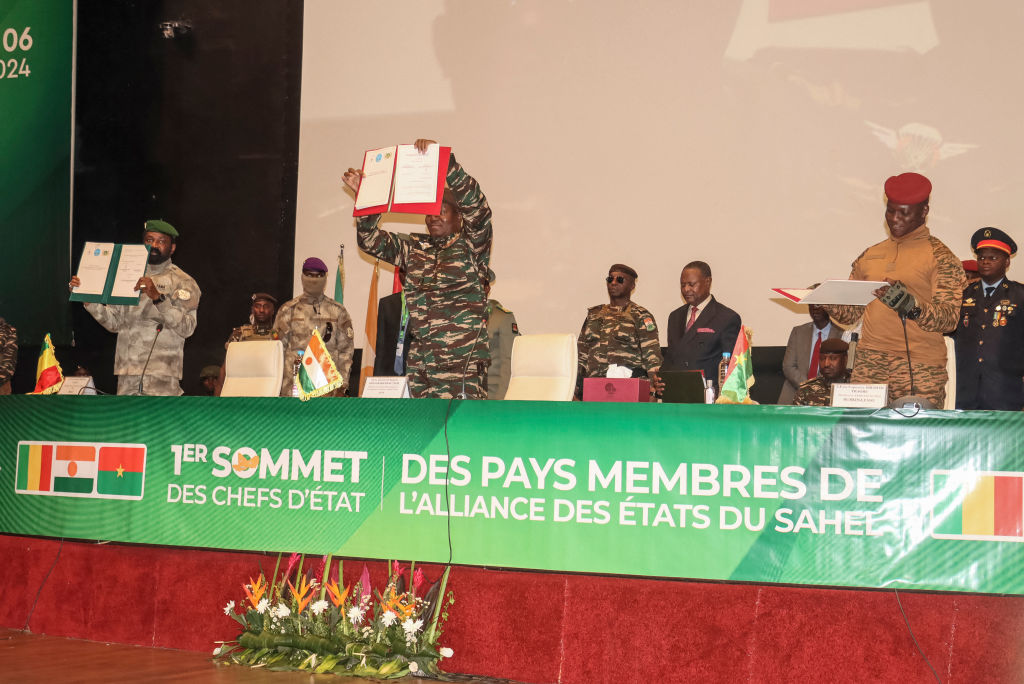
ADF STAFF
Sahelian junta leaders claim their new regional bloc will help them fight extremists and share economic resources. However, observers believe the turn inward, combined with a shift toward Russia, is likely to worsen the violence and insecurity that plagues all three countries.
In early July, the military leaders of Burkina Faso, Mali and Niger signed documents creating the Confederation of Sahel States (CES), the successor to the Alliance of Sahel States (AES), a mutual defense pact created in September 2023, less than two months after Nigerien President Mohamed Bazoum’s presidential guard overthrew him.
Along with creating the new alliance, all three countries withdrew from the Economic Community of West African States (ECOWAS).
The announcement prompted a warning from ECOWAS Commission President Omar Alieu Touray that the three countries risk “diplomatic and political isolation” and the loss of millions of dollars in investments.
Touray said the rupture imperils a region already teetering on the brink of disaster.
“Beyond numerous threats linked to peace and security as well as the challenges linked to poverty, our region is also confronting the risks of disintegration,” Touray said.
Violence in all three countries has escalated dramatically following the coups — doubling in Burkina Faso in the year after its coup and jumping 70% in Mali and 60% in Niger in each of the years following their coups.
In a search for help against extremists, the juntas each have grown closer to Russia, which has more than 2,000 members of its Africa Corps mercenaries (formerly the Wagner Group) in the region. In Mali, Russian mercenaries have participated in brutal attacks on civilians, including the massacre of more than 300 men in the community of Moura in 2022.
Together, the three countries lead the world in deaths from terrorist attacks.
With more than half its territory beyond government control, Burkina Faso has become the epicenter for violent extremism in the Sahel. The governing junta’s decision to enlist volunteer militia in its anti-extremist efforts has led to an increase in extrajudicial killings and human rights violations.
Burkina Faso’s junta said it fended an attempted mutiny in September 2023 with help from Russian fighters stationed in Mali.
“In addition to insecurity and instability, these countries are engulfed with various socio-economic problems combined with traditional cultural practices that have lessened development,” Maurice Okoli, a fellow at the Institute for African Studies, wrote recently for the Eurasian Review. “The system of governance and poor policies largely hinder sustainable development.”
Guinea’s ruling junta has expressed sympathy with the juntas ruling Burkina Faso, Mali and Niger. Observers say the new Sahelian alliance could create an opportunity for Guinea’s junta to renege on its ECOWAS-approved plan to return to democracy by the end of this year. Guinea, which has been building ties with Russia and China, would provide the alliance with a bridge to the Atlantic Ocean through southwest Mali.
The decision to withdraw from ECOWAS also will be a major blow to security cooperation and intelligence sharing in the region, particularly at a time when coastal nations are threatened by terrorism encroaching south from the Sahel, according to ECOWAS Commission Chief Omar Alieu Touray.
The loss of Burkina Faso, Mali and Niger undermined the G5 Sahel anti-terrorism alliance in December when it left Chad and Mauritania as the only remaining members.
Analysts say breaking with ECOWAS is unlikely to solve the problems plaguing the three countries.
“It is not enough in terms of being able to muster the needed economic strength, which can translate to military strength,” analyst Chris Isike from the University of Pretoria told Newzroom Afrika. “The earlier they realize the futility of acting alone and in an isolationist manner the better.”
Beyond security issues, difficulties such as Mali’s ongoing lack of electricity will weaken the juntas if living conditions continue to deteriorate, Virginie Baudais, director of the Stockholm International Peace Research Institute’s Sahel and West Africa Program, told France24.
“Sovereignty cannot be eaten,” Baudais said.
The post As Sahel Countries Form Regional Bloc, Experts Warn of Isolation, Violence appeared first on Africa Defense Forum.










